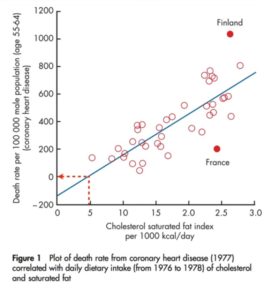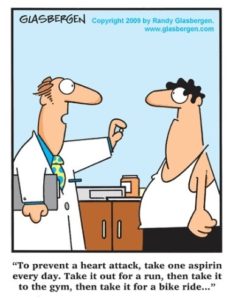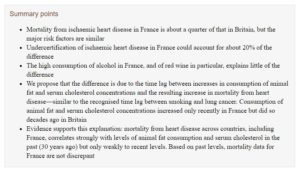
Two blogs in a day! There’s a reason for this. In the earlier blog1 I questioned the integrity of the egg industry, particularly in relation to how they strive to support research and media stories that get the public utterly nonplussed and, thereby, dismissive of all facts-driven data about which foods are really healthy and which are only mutton dressed as lamb. Well a blog2 by Dr Greger dropped into my inbox just now and he referred to some previous WHO (World Health Organisation) study that brought into question another section of society whose honesty we ought to be able to trust – namely, doctors – in this case, French doctors.
Blog Contents
The French Paradox3
 When you look at countries that consume the most saturated fat and cholesterol from animal foods, there’s a reliable correlation with increased death rates from heart disease.
When you look at countries that consume the most saturated fat and cholesterol from animal foods, there’s a reliable correlation with increased death rates from heart disease.
The converse is true – countries eating less animal foods have reduced death rates from heart disease. Okay, now what’s the paradox? France does not appear to fit with this correlation, and neither does Finland (the latter country has more deaths than would be expected, while the former, France, has less deaths, considering the relatively high amounts of saturated fat and cholesterol they now consume).
So are we to get the glasses out and celebrate that the boozy answer lies in the amazing benefits of resveratrol4 in the red wines the French are so good at producing (and drinking)?5 Or is it the comparatively larger amount of protective plant foods they consume?6 The answer is a little less “palatable”.
Paradox is Partly a Tissue of Lies
 So, here’s the link up with the earlier blog on the egg industry. It transpires that French doctors have been under-reporting (a nice way of saying “lying about”) ischaemic heart disease (IHD) – the previous name for coronary heart disease (CHD) which is where your coronary arteries narrow by gradual build-up of fatty material.7 And they’ve apparently been doing this for decades, being that the WHO investigation that revealed this was back in 1995.8
So, here’s the link up with the earlier blog on the egg industry. It transpires that French doctors have been under-reporting (a nice way of saying “lying about”) ischaemic heart disease (IHD) – the previous name for coronary heart disease (CHD) which is where your coronary arteries narrow by gradual build-up of fatty material.7 And they’ve apparently been doing this for decades, being that the WHO investigation that revealed this was back in 1995.8
How much have they been under-reporting? Apparently around 20% of all CHD deaths are not reported as such.9 Taking this into consideration, there is no longer a paradox and France has just about the same correlation between increased animal food consumption and increased heart disease.
Et voila!
(See Notes for a Summary from the latter report.)
Perhaps the reason French doctors are tempted/encouraged to reduce the number of deaths attributable to CHD is because they don’t want to admit that there is a problem with La Cuisine Française. This doesn’t seem so strange when you look at how protectionist they are about their “pure” and superior French language.10 11
Time will Put Paid to the Paradox12
The US has been eating the SAD (standard American diet) for over 40 years now13 , whilst the French have only more recently started to eat more and more processed animal foods and less and less plant foods. As has been pointed out in a number of reports14 15 , it takes time for the diseases to manifest – although, in the case of the French, it appears that it already has done so if the above “missing” 20% is added into the mix. I think we can expect to see even greater increases in death rates due to diet-related diseases throughout the whole of Europe over the next decades, unless some major dietary changes are made. Only time – but, unfortunately, maybe not the doctors – will tell…16 17

A video18 by Dr Greger also covers this issue.
Notes

Summary points from a 1999 BMJ report.19
References
- Eggs are Bad For You – Don’t Believe the Lies [↩]
- What About the French Paradox? Written By Michael Greger M.D. FACLM on May 22nd, 2018 [↩]
- A Evans. The French paradox and other ecological fallacies. Int J Epidemiol. 2011 Dec;40(6):1486-9. [↩]
- Resveratrol Impairs Exercise Benefits. Michael Greger M.D. FACLM December 25th, 2015 Volume 28 [↩]
- M H Criquil, B L Ringel. Does diet or alcohol explain the French paradox? Lancet. 1994 Dec 24-31;344(8939-8940):1719-23. [↩]
- S M Artaud-Wild, S L Connor, Sexton, W E Connor. Differences in coronary mortality can be explained by differences in cholesterol and saturated fat intakes in 40 countries but not in France and Finland. A paradox. Circulation. 1993 Dec;88(6):2771-9. [↩]
- British Heart Foundation: Coronary heart disease [↩]
- M L Burr. Explaining the French paradox. J R Soc Health. 1995 Aug;115(4):217-9. [↩]
- M Law, N Wald. Why heart disease mortality is low in France: the time lag explanation. BMJ. 1999 May 29; 318(7196): 1471–1480. [↩]
- Protectionism and the Linguistic Reality of the French Language as Depicted through the Works of Erik Orsenna. By Rachel Poulin. Senior Honors Thesis. French and Francophone Studies. University of North Carolina at Chapel Hill. April 6, 2016. [↩]
- Trinity College Law review: French language law: The attempted ruination of France’s linguistic diversity. Posted on 4th March 2015 by The Editorial Board. Gavin Radford. [↩]
- A Evans. The French paradox and other ecological fallacies. Int J Epidemiol. 2011 Dec;40(6):1486-9. [↩]
- Public Health Nutr. Author manuscript; available in PMC 2011 Apr 1. Trends in meat consumption in the United States. Carrie R. Daniel, Amanda J. Cross, Corinna Koebnick, and Rashmi Sinha. [↩]
- Lancet. 1992 Aug 1;340(8814):314-5. Wine and coronary heart disease. Nestle M. [↩]
- BMJ. 1999 Oct 16; 319(7216): 1073. Attribution of time lag theory to explain French paradox. Malcolm Law, reader. Nicholas Wald, professor [↩]
- Lancet. 2006 Aug 12;368(9535):564-5. Food industry and health: mostly promises, little action. Nestle M. [↩]
- J Ferrieres. The French paradox: lessons for other countries. Heart. 2004 Jan; 90(1): 107–111. [↩]
- What Explains the French Paradox? Michael Greger M.D. FACLM December 23rd, 2015 Volume 28 [↩]
- M Law, N Wald. Why heart disease mortality is low in France: the time lag explanation. BMJ. 1999 May 29; 318(7196): 1471–1480. [↩]